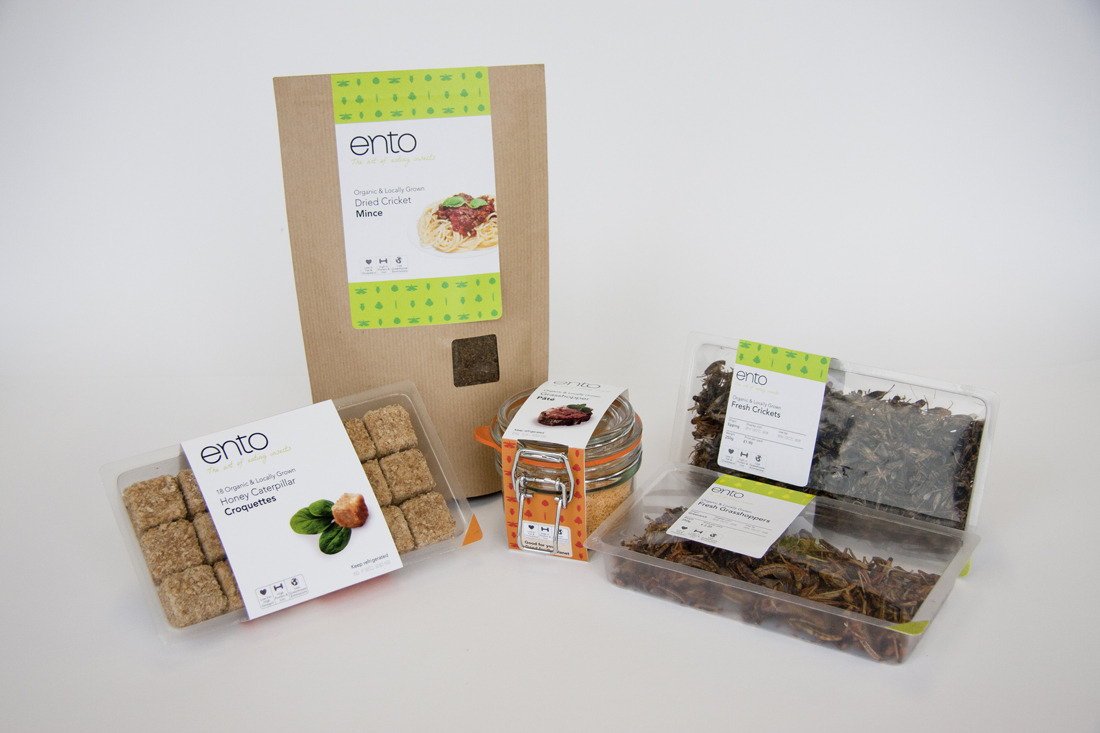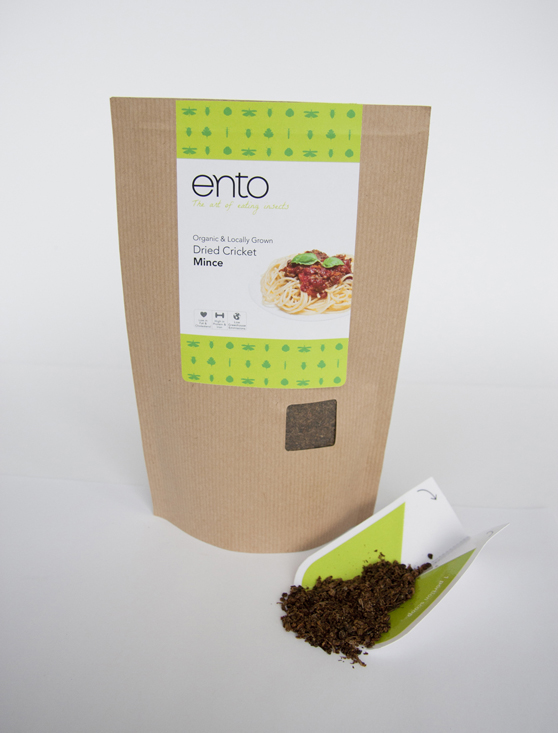Ento
For most Westerners picking up a pack of insect based snacks for lunch may seem a little difficult to conceive. Ento is a project…


For most Westerners picking up a pack of insect based snacks for lunch may seem a little difficult to conceive. But eating insects, or entomophagy, is far from obscure. In fact, insects have been eaten for thousands of years. And for numerous cultures across Asia, South America and Africa insect dishes are nothing unusual. For many in the West however, the thought of dining out on an insect meal is much more difficult to stomach. Ento is a project by four students at the RCA that looks to change some of these perceptions.

Compared to beef, insects are ten times more efficient to produce, and if you combine this with the fact they can be farmed at a very high density

Through research into some of the psychology behind our aversion to eating things with multiple pairs of legs, they’ve developed a concept to place insects into our cuisine. ‘No one has really looked into the human side – the acceptance’, says Jon Fraser, who, along with Aran Dasan, Jacky Chung, and Julene Aguirre-Bielschowsky, has devised the project. ‘There are lots of people looking at the production side of eating insects. But we thought the best route was to first challenge acceptance’. The group have been motivated by the growing issue of food sustainability in an increasingly hungry world. It is estimated that by the year 2050 the world population will increase by 50 percent to nine billion. And global food demand will have doubled. ‘The problem is that food demand is outpacing population growth’, explains Jon. ‘And productivity can’t keep up. Or if it can it will have an even bigger environmental impact.’

Insects could be a suitable alternative. ‘Compared to beef, insects are ten times more efficient to produce’, explains Jon. ‘And if you combine this with the fact they can be farmed at a very high density, you have a much lower food-print.’ For example, the area it takes to produce one kilogram of grasshoppers is much lower than the area it takes to produce one kilogram of beef. Additionally, insects can be farmed much closer to cities, therefore reducing food miles. And not only are insects a good source of protein, they’re also high in vitamins and minerals, and lower in fat than traditional meats. The group have also explored the idea that an increase of insects in our diet could help decrease the risk of animal-human disease transmission. According to Jon, the risk of pandemics could be reduced if we were less reliant on food that is more similar to us genetically. ‘Very basically’, explains Jon, ‘as our genetic structures are so different from insects, the risk of shared or transmitted diseases is much lower. So where we have bird or swine flu, we wouldn’t see grasshopper flu.’ But how do you convince the western world to adopt and adapt to new eating habits? Especially as, for most of us at least, eating insects just seems a bit weird. ‘From what we found’, explains Jon, ‘it really boils down to one issue: people just don’t want to eat them. The biggest roadblock is to change public perception.’ Through their research they realised that people were more likely to try insect food if it was presented in a familiar way. ‘As long as it was abstracted, people’s reactions to the insects were dampened. They were much more willing to give the food a try, and this idea informed our food design quite heavily.’ The result is Ento: a design that looks more like takeaway sushi in a bento box than the typical deep-fried insects you might see in a foreign market.


So through a series of well-designed products and well-created dishes they believe an acceptance can be built to overcome some of these cultural obstacles. ‘We didn’t want to just put grasshoppers on top of a salad – that’s just purely gimmick’, asserts Jon. ‘We wanted it to have a message of sustainability, and have people look at the product and consider insects as a more sustainable food type.’ ‘And the branding is designed to be forward-looking’, explains Jon, ‘positioning insect based products as a future food option. But we also wanted to keep the design fresh and natural, as well as making it playful.’ Through a series of food and eating experiences the group seek to build awareness of the benefits of edible insects and hopefully challenge some of our western cultural habits. And as the group predict on their website, by 2020, fresh grasshoppers might be a familiar sight on our local supermarket shelves.




Discussion